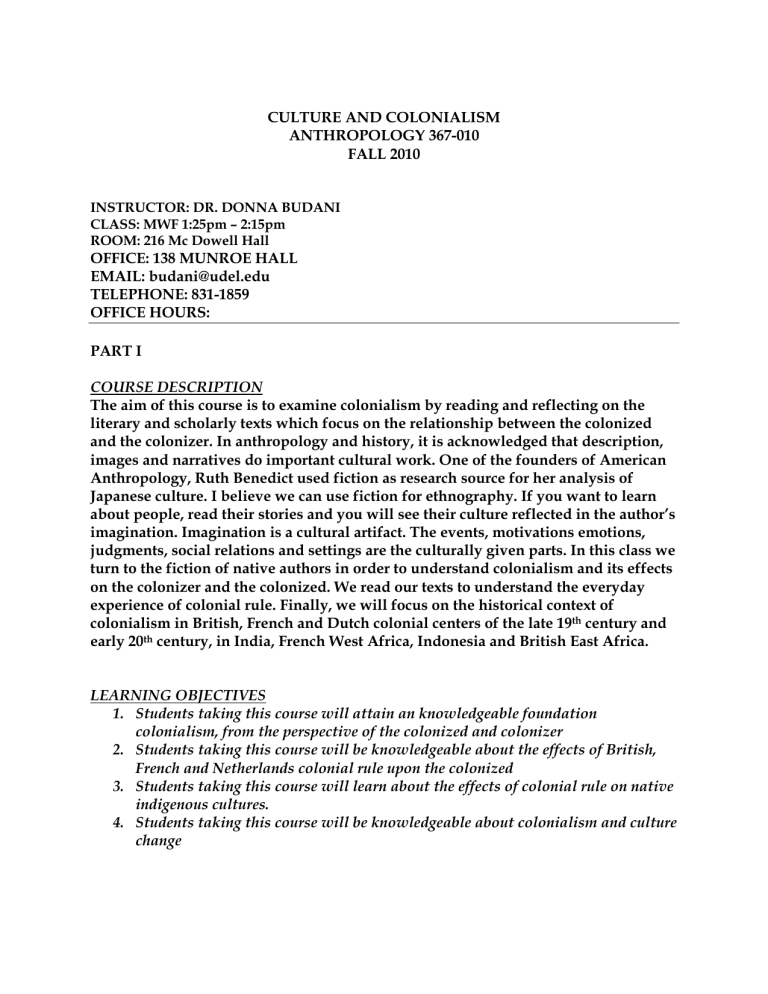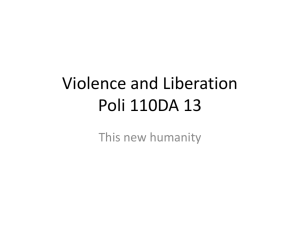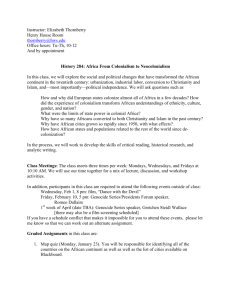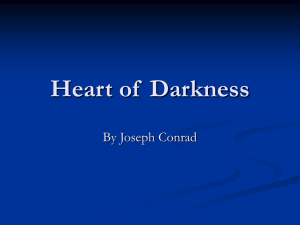CULTURE AND COLONIALISM ANTHROPOLOGY 367-010 FALL 2010

CULTURE AND COLONIALISM
ANTHROPOLOGY 367-010
FALL 2010
INSTRUCTOR: DR. DONNA BUDANI
CLASS: MWF 1:25pm – 2:15pm
ROOM: 216 Mc Dowell Hall
OFFICE: 138 MUNROE HALL
EMAIL: budani@udel.edu
TELEPHONE: 831-1859
OFFICE HOURS:
PART I
COURSE DESCRIPTION
The aim of this course is to examine colonialism by reading and reflecting on the literary and scholarly texts which focus on the relationship between the colonized and the colonizer. In anthropology and history, it is acknowledged that description, images and narratives do important cultural work. One of the founders of American
Anthropology, Ruth Benedict used fiction as research source for her analysis of
Japanese culture. I believe we can use fiction for ethnography. If you want to learn about people, read their stories and you will see their culture reflected in the author’s imagination. Imagination is a cultural artifact. The events, motivations emotions, judgments, social relations and settings are the culturally given parts. In this class we turn to the fiction of native authors in order to understand colonialism and its effects on the colonizer and the colonized. We read our texts to understand the everyday experience of colonial rule. Finally, we will focus on the historical context of colonialism in British, French and Dutch colonial centers of the late 19 th century and early 20 th century, in India, French West Africa, Indonesia and British East Africa.
LEARNING OBJECTIVES
1.
Students taking this course will attain an knowledgeable foundation colonialism, from the perspective of the colonized and colonizer
2.
Students taking this course will be knowledgeable about the effects of British,
French and Netherlands colonial rule upon the colonized
3.
Students taking this course will learn about the effects of colonial rule on native indigenous cultures.
4.
Students taking this course will be knowledgeable about colonialism and culture change
REQUIRED BOOKS
1.
A Passage to India. E. M. Forster, author.
2.
Child of All Nations. Pramoedya Ananta Toer, author.
3.
African Perspectives on Colonialism. A. Adu Boahen, author.
4.
God’s Bits of Wood. Sembene Ousmane, author
5.
The River Between. Ngugi WA Thiong’o, author
6.
Weep Not, Child.
Ngugi WA Thiong’o, author
ABOUT THE READING MATERIALS
At first glance it might appear that the required reading is excessive. A more studied review will reveal that the readings assigned are a selection of different types of readings. Some are historical novels about colonialism, while others historical studies in which colonialism is the central theme. All the books are very reader friendly and attention grabbing. For example, African Perspectives on the Colonial
Encounter, 120 pages in length, provides a study of African culture and everyday life before European colonialism. The River Between is under 160 pages in length introduces us to pre-colonial Kenya on the eve of occupation by Europeans. Some of other novels are longer but are also quick reads. Weep Not, Child is under 100 paged in length. A Passage to India can be read in less than 3 hours. I have counted pages for each reading assignment to ensure that no assignment is excessive and I have also taken into consideration the total amount of reading for any given week. I believe that the books can be read in the suggested time frame. Do as much of the reading as is possible for you to do. If you have any difficulty with keeping up with the readings, please see me as soon as possible. I will work with you to ensure that you are not put at a disadvantage due to the reading schedule.
PART II
COURSE REQUIREMENTS
DISCUSSION QUESTIONS & COMMENTS FOR EACH CLASS A TOTAL OF 300
POINTS
Class participation is an essential part of this course. One way you participate is by preparing discussion questions and comments, for each class. Write two questions and make comments based on your reflection of the assigned readings. What are the central themes in the reading? The aim of your questions and comments is to serve as a departure point for class discussion. Take notes as you read and record your reactions to, and comments about what you read. Also, make note of the questions that come to mind as you read and as you reflect on what you read. Identify the central themes about colonialism in the reading. I recommend that you take reading notes ( annotate your text or jot down your notes on a pad ) about key themes and
something that strikes you as interesting, strange or something you want to know more about. Note your reactions to what you read and raise questions about what you read. Look over your notes and compose two questions and make your comments about the reading or anything that relates to colonialism in the readings. I prefer that you type your questions and comments –be sure to include your name, the date and the specific reading assignment. However, if time is a factor, hand write your questions and comments on lined paper, full size and place your name, date and reading assignment on the top of the page. Be sure your handwriting is legible, neat and I can, with ease, read your handwriting. If I cannot read your questions and comments, I cannot grade your work. If I do not grade your work, you will not receive credit for your work. Discussion questions and comments are due for each class and must be handed in at the end of class. Discussion questions and comments cannot be made-up if class is missed. Exceptions to this policy may apply to your situation. If class is missed for reasons beyond your control, please contact me as soon as possible via email. Ten points are deducted for each discussion question not turned in.
HISTORICAL ANALYSIS A TOTAL OF 200 POINTS
Consider the required texts as historical source material about colonialism. Select any two of the assigned books, follow the instructions below and write an analysis of the selected text. Central themes focused on in your analysis are colonialism, the colonizer and the colonized. See the course schedule for due dates. Remember you cannot address each and every one of the following questions in your analysis and I would not want you to do so.
You need to be selective. Demonstrate what you have learned about colonialism, the colonized and the colonizer.
QUESTIONS FOR ANALYSIS
BE SELECTIVE ABOUT WHICH QUESTIONS YOU WILL ADDRESS.
Review the following list of questions and select those that will help you write a comprehensive analysis of your selected book. You may add other questions to the list.
What have you learned about colonialism and/or the colonizer and/or the colonized?
What is your over-all opinion of the reading? On what basis has this opinion been?
Formed?
What was the author’s message, perspective, or argument about colonialism?
What was he/she trying to get across about colonialism and its affects?
How are the author’s main points about colonialism presented, and explained?
How are colonialism, the colonized and the colonizer depicted in the source?
What are the different perspectives about colonialism presented in the book?
What are the different “voices” present in the book and what do they represent in regards to colonialism?
Describe the society presented in the source. Who are the colonized and who is the colonizer. Describe the relationship between the colonizer and the colonized. What is the position of the colonized and how has colonialism affected their lives and their position under colonial rule.
How has colonial rule affected the lives of women both the colonizer and the colonized? What is the status of native women under colonial rule? What is the status of European women?
What about the silences in the book—what does the author choose not to talk about?
Is colonialism presented either as an ideology or behavior or both?
What are the explicit messages about colonialism and what are the more implicit messages about colonialism?
What historical questions can you answer about colonialism, the colonizer and the colonized using this kind of “source”?
What questions about colonialism can this source not help you answer?
What do you know about the author that would explain why he/she wrote the text?
What are the aims of the author?
Technical considerations include one inch margins all around, line spacing at 1.5 and use no font larger than 12. Prepare a cover page. Place your title centered on the cover paper of your analysis. Also, above the essay’s title, place your name and class designation i.e., Anth367-010 Fall Semester. A comprehensive and detailed analysis includes as minimum 8 of the above questions. Be sure your analysis has concluding comments and reflective after thoughts.
SHORT ANSWER ESSAY QUESTIONS EXAM A TOTAL OF 200 POINTS
Two short answer essay questions take home exams will be given during the term.
See course schedule for dates when exams are distributed in class and when exams are due in class. Exams must be typed. Questions on the exam will reflect assigned readings, class discussion and lecture. A typical exam is either a 12 or 13 question exam in which you self select 10 questions. I advise you to do a Google search for
How to Write an Essay Answer before you start your exam. Technical considerations include setting one inch margins all around, line spacing is 1.5 and use a font no larger than 12. Answer one question per page. Questions are written single spaced while answers are 1.5 lines spaced. Rewrite the number and question you are answering, drop one line and begin to type your answer. No need for cover page; place your name date on all pages of your exam. Number the pages of your exam; staple all pages together and place your exam in a folder. I will not accept an exam that does not follow these technical guidelines, especially exams where names, and page numbers are missing; I will not accept an exam that is not stapled and is not in a folder. I do not accept exams that are late. However, it may be the case that there are special circumstances for which I may give an extension of two days. Please inform me prior to the exam if you think you will need an extension. DO NOT ASSUME
THAT AN EXTENSION IS AUTOMATICALLY GIVEN.
ESSAY ARTICLES FROM THE JOURNAL OF ROYAL AFRICAN SOCIETY. 100
POINTS
See course schedule for reading assignment on articles from the Journal of Royal
African Society. The articles were written in the beginning of the 20 th century at the height of European colonization of Africa as colonialism shaped Africa. European
colonialism was assumed to be a right exercised by industrial European nations. The readings give you some insights of Europeans thoughts and behavior as they settled in Africa. Select any five articles (each article is very short, less than 3 pages on a half size page) and write a 5 page essay in which you discuss your impressions of the articles, especially how the authors ideas and perspectives of Africa, African society and the native peoples of Africa. Treat your five articles as a whole but when referring to something in a particular article, cite the article by title and journal information. The “scholars” who wrote these articles assumed colonial conquest as a given right, its mission was to bring civilization to African and there was an absence of society in Africa.
Use the following questions to prompt your review of the articles:
What are some of the assumptions held by the author about Africans and African society?
What ideas, beliefs and norms seem to be taken for granted but would not be acceptable today?
What are the images of Africa and Africans presented in the articles? What impressions of colonialism. the colonizer and the colonized do you obtain from the articles you have selected?
Do you find evidence of racism and ethnocentrism? Explain.
What is missing from the articles that would appear in a contemporary scholarly article?
What is present in the articles that would be strongly objected to in the present day?
Write a conclusion with reflective comments about the articles. Be sure to identify the articles you select by title and author in your essay.
TECHNICAL CONSIDERATIONS
Use the above questions to write your essay. The length of your essay depends on the detail and comprehensive answers to the above questions which should be between 5 and 6 pages. Use one inch margins all around and use no font larger than 12. No need for title page. Write the title centered on the page, drop a line and begin your essay.
Place your name and class designation (Anth367-010) in the upper left corner of the page. Use 1.5 line spacing. Number the pages of your essay
PART III
COURSE ETIQUETTE
• The University is a place for adults. I expect that you will act like responsible, trustworthy, and reliable adults
• All cell phones, pagers, PDA’s and other electronic devices must be turned off.
• Sitting in class doing work for another class or sending and receiving text messages WILL RESULT IN A LOSS OF 10 POINTS FROM YOUR FINAL
GRADE.
• Once you enter the classroom and take your seat I consider you committed to staying for the full class. If you do not intend to stay for the entire class or the entire film, please do not come to class
• If you intend to leave class before the end of lecture, you must inform me before class, sit in the back close to the door and leave class as quietly as possible. Be sure not to slam the door.
COURSE ATTENDANCE POLICY
Consistent consecutive attendance is required. Students are permitted three unexcused absences. Three or more unexcused absences will result in a loss of 8 points for each unexcused absences. Attendance will be taken regularly at each class session and recorded per student in my records for this class. It is your responsibility to make sure that you sign the attendance list for each class. If your car breaks down or doesn’t start or whatever happens that prevents you from attending class, send me an email as soon as possible. Bottom line: you must have my permission to miss class or you will be charged 8 points. An unexcused absence is an absence for which you do not have my permission. For each unexcused absence 8 points will be deducted from your total points earned by the end of the term. An excused absence is one that I have given permission for the absence to a particular student. Absences due to illness require a doctor’s note. Absences because of university related activity, for example, sports events, require prior notice be given to me at least one week before the expected absence. Students are required to notify me via email prior to class about their absence. Notification after the absence is unacceptable. Absences due to religious observation are considered as excused absences. However, students absent for religious observance are still required to inform me about their expected absence.
In all other cases, I will use discretion on a case by case basis.
MUTUAL RESPECT
Once class begins we become a community that has rules. The purpose of our gathering is to focus on the topic and readings assigned for the day. Mutual Respect is demonstrated by me when I am prepared to teach the day’s lesson. Mutual Respect is demonstrated by you when you come to class prepared to participate in discussion about the day’s reading assignment. Also, you demonstrate respect by paying attention and doing the work of the class not the work of another course. No texting is permitted during class. We each have expectations of the other. You expect me to be prepared and to be a good teacher. You expect to learn something about colonialism. I expect you come to class prepared, having done your reading, and ready to participate in class.
SPECIAL CIRCUMSTANCES
I assume that many of you work more than 20 hours a week, travel to school in cars that break down or you have a demanding major or you have academic special
circumstances or you have obligations to your family or you may have children of your own. Please make me aware of any special circumstance that has the potential to or will impact on your performance in this course. I will do all I can to work with you so that you chances of getting a good grade is supported
OFFICE HOURS
I refer you to the first page of this document where you will find the location of my office and my office hours. I invite you to take advantage of my office hours. I encourage all students to regularly consult with me concerning lecture material, i.e. unclear or confusing notes, readings, any other matter affecting your performance in this class. Or, just come in for a friendly chat. If you prefer, consultation may be conducted via email. I promise a quick response to all emails.
POLICY CONCERNING MAKE-UP EXAMS
It is not my policy to give extensions for all hand-in assignments. Exceptions of this policy include circumstances such as illness, family emergency, religious observance and absences due to university business provided that appropriate documentation is given to me . If given permission for an extension, I must be convinced that your situation is beyond your control. Extensions are limited to three days. No extension for assignments will be given after the 3 rd day. It would be wise to keep in mind that
I do not give extensions easily. As a matter of strict policy, I do not accept work that is submitted via email. The exception to this rule is when you miss class but have prepared your discussion questions and comments; you may send this material to me via email. If for legitimate reasons, illness, family and university obligations, or having difficulty meeting course requirement, or you are unable to meet due dates, students must speak to me and obtain my permission for submitting your work late.
NO WORK WILL BE ACCEPTED LATE ITHOUT MY PERMISSION.
COURSE GRADE
Distribution of Grades
A = 94% A-= 90% B+ = 87% B = 85% B- = 80% C + = 77% C=75% C- = 70%
D+ = 67% D = 65% D- = 60% F = 59% or below
COURSE SCHEDULE
CULTURE AND COLONIALISM
ANTH367-010
FALL 2010
Please note: This schedule of readings, class assignment and performance requirements is subject to change. Changes are made when, for pedagogical reasons, changes to schedule seem prudent. Changes will be announced in class and in an email to the class.
My advice to you is to be as flexible as possible. If changes are made to the schedule of classes and/or to class exercises, changes will be made within a time frame that is least disruptive to students in the class.
Wednesday, September 1 st
Course Overview
Review Syllabus
Review Texts
Review Assignments for Friday and Wednesday
Friday, September 3 rd
Reading Assignment:
On UDEL Home Page click Libraries & Select Morris; then select Database; then select “j” for JSTOR; At JSTOR select Browse Disciplines
Select African Studies
Select Journal of the Royal African Society
Select Vol. 3, No 11, April, 104
The Conditions of Negro Labor in the South African Mines pp.231-237
H.H. Johnson, author
Select Vol. 5, No. 18, January 1906
The Problem of Agricultural Development in West Africa pp.117-129
Emile Baillaud
Select Vol. 5, No 20, July 1906
1. The Aborigines of South Africa pp.381-388
A, Worner, author
2. The Regeneration of Africa pp404-408
P. Ka Lsaka Seme, author
Select Vol. 6, No. 23, April, 1907
Sierra Leone and the Natives of West Africa pp. 250-258
Leslie Probyn, author
Wednesday, September 8 th
On UDEL Home Page click Libraries & Select Morris; then select Database; then select “j” for JSTOR; At JSTOR select Browse Disciplines
JSTOR Browse Disciplines
Select African Studies
Select Journal of the Royal African Society
Select Vol. 10 No. 37, OCT., 1910
The Native Races of German East Africa
A. Werner, author
Select Vol.14, No. 55, April, 1915
The Gold Coast Hinterland and The Negroid Race
C. E. Cookson
Select Vol. 14, No.54, January, 1915
Native Education in German Africa pp. 123 -142
Hanns Vischer, author
Select Vol. 15, No. 60 July, 1916
Some Aspects of Thinking Black
F.W.H. Migeod, author
Select Vol. 22, No.87, April, 1923
Some Native Problems in Eastern Africa pp.189-202
C. W. Hobley
Friday, September 10 th
Film: White king, red rubber, black death DVD 4046
Begin Reading: African Perspectives on Colonialism, pp.1-57
Monday, September 13 TH
Film: White King, red rubber, black death DVD 4046
Essay on Readings in The Journal of the Royal African Society due in class
Wednesday, September 15 th
Reading Assignment
African Perspectives on Colonialism, pp.1-57, A. Adu Boahen, author
Discussion Questions and Comments due in Class
Friday, September 17 th
African Perspectives on Colonialism, pp.58-93, A. Adu Boahen, author
Discussion Questions and Comments Due in Class
Monday, September 20 th
Reading Assignment
Introduce The River Between
Wednesday, September 22 nd
Reading Assignment
The River Between, pp. 1-66, Ngugi WA Thiong’o, author
Discussion Questions and Comments Due in class
Friday, September 24 th
Reading Assignment
The River Between, pp. 67-152, Ngugi WA Thiong’o, author
Discussion Questions and Comments Due in class
Monday, September 27 th
A Passage to India E.M. Forester, author Chapters 1-V
Introduction
Discussion Questions and Comments Due in Class
Wednesday, September 29 th
Reading Assignments
A Passage to India, E.M.Forster, author, Chapter VI-XI
Discussion Questions and Comments Due in Class
Friday, October 1 st
Reading Assignment
A Passage to India, E.M. Forester, author, Chapter XII – XV11
Discussion Questions and Comments Due in Class
Monday, October 4 th
Reading Assignment
A Passage to India, E. M. Forester, author, Chapter XVIII – XXIII
Discussion Questions and Comments Due in Class
Wednesday, October 6 th
Reading Assignment
A Passage to India, E. M. Forester, author, Chapter XXIV – XXX,
Discussion Questions and Comments Due in Class
Friday, October 8 th
Reading Assignment
A Passage to India Chapter XXXI- Finish the book
Discussion Questions and Comments Due in Class
Monday, October 11 th
Film: Gandhi DVD 3952
Begin Reading Child of All Nations
Wednesday, October 13 th
Film: Gandhi DVD 3952
Friday, October 15 th
Film: Gandhi DVD 3952
Monday, October 18 th
Film: Gandhi DVD 3952
*First Book Analysis Due in Class Today
Wednesday, October 20th
Introduction to P.Ananta Toer’s Child of All Nations
Introduction by Max Lane
Child of All Nations, P Ananta Toner, author, pp. 13 - 46
Discussion Questions and Comments due in class
Friday,, October 22 nd
Reading Assignment
Child of All Nations, P Ananta Toner, author, pp. 47 - 106
Discussion Questions and Comments Due in Class
Monday, October 25th
Reading Assignment
Child of All Nations, P. Ananta Toner, author, pp.
107- 176
Discussion Questions and Comments due in class
Wednesday, October 27 th
Reading Assignment
Child of All Nations, P. Ananta Toner, author, pp.
176 - 212
Discussion Questions and Comments due in class
Friday, October 29 th
Reading Assignment
Child of All Nations, P. Ananta Toner, author, pp 213 – 285
Discussion Questions and Comments due in class today
*Exam 1 Distributed in Class Today
Monday, November 1 st
Reading Assignment
Child of All Nations, P. Ananta Toner, author, pp 286 - 315
Discussion Questions and Comments due in class
Wednesday, November 3 rd
Reading Assignment
Child of All Nations, P. Ananta Toner, author, pp 315 – 347
Discussion Questions and Comments due in class
Friday, November 5th
Summary Discussion
Monday, November 8 th
Film: Emitai- Depicts Clash between French Colonialist and Dolas tribe in Senegal
VHS 8903
*Exam 1 due in class today
Wednesday, November 10 th
Film: Emitai- Depicts Clash between French Colonialist and Dolas tribe in Senegal
VHS 8903
Friday, November 12 th
Reading Assignment
God’s Bits of Wood, Sembene Ousmane, author, pp.1-49
Discussion Questions and Comments due in class
Monday, November 15 th
Reading Assignment
God’s Bits of Wood, Sembene Ousmane, author, pp. 50-90
Discussion Questions and Comments due in class
Wednesday, November 17 th
Reading Assignment
God’s Bits of Wood, Sembene Ousmane, author, pp.91 - 136
Discussion Questions and Comments due in class
Friday, November 19th
Reading Assignment
God’s Bits of Wood, Sembene Ousmane, author, pp. 137-185
Discussion Questions and Comments due in class
Monday, November 22 nd
Reading Assignment
God’s Bits of Wood, Sembene Ousmane, author, pp. 205 - 248
Discussion Questions and Comments due in class
Wednesday, November 24 th
CLASS CANCELED THANKSGIVING HOLIDAY
Friday, November 26 th
CLASS CANCELED THANKSGIVING HOLIDAY
Monday, November 29 th
Reading Assignments
God’s Bits of Wood, Sembene Ousmane, author, pp. 186-204
Discussion Question and Comments due in class
*Second Short Answer Essay Question Exam Distributed in class today.
Wednesday, December 1 st
Reading Assignment:
Weep Not, Child Ngugi WA Thiong’o, author
Friday, December 3 rd
Reading Assignment:
Weep Not, Child Ngugi WA Thiong’o, author
**Second Book Analysis due in class
Monday, December 6 th
Reading Assignment
Weep Not, Child Ngugi WA Thiong’o, author
Wednesday, December 8 th
*Short Answer Essay Exam Due in Class Today.
GENERAL STATEMENT OF POLICIES AND PROCEDURES
FOR STUDENTS IN ANTHROPOLOGY
The University of Delaware's Board of Trustees, Administration, Faculty and Students have together developed a set of policies and procedures governing the rights and responsibilities of those engaged in the education process. Certain of these policies and procedures apply to the conduct of classes and are clearly explained in the annual STUDENT GUIDE TO UNIVERSITY POLICIES prepared by the
Office of Campus Life. It is a responsibility of both students and faculty that they be knowledgeable about the content of this document which can be accessed at http://www.udel.edu/stuguide/07-
08/code.html
.
Students in anthropology classes will be held responsible for understanding and adhering to the Statement of Academic Policy.
Plagiarism ( http://www.english.udel.edu/wc/student/handouts/plagiarism.html
) and other forms of cheating will be handled through the University's judicial process. If you have doubts about correct practice, you should seek the advice of your instructor before completing assignments. For those anthropology courses that require written, out of class papers, the Department strongly advises, and in some courses may require, the use of A Manual for Writers of Term Papers, Theses, and Dissertations,
Sixth Edition, by Kate L. Turabian. It is available in the University Bookstore.
The Department of Anthropology subscribes to University Policies and seeks to remain in conformity with them; it will expect of students that they do the same. It is your responsibility to familiarize yourself with the University’s Code of Conduct.
As a Department we are especially concerned that students be aware of their rights as well as their responsibilities. Since we expect to hold you to your responsibilities we expect to be held to ours. As members of a faculty and as anthropologists we have both an institutional and disciplinary commitment to just and equitable regard for human differences; differences of gender, race, ethnicity, religion, age, physical condition and sexual preference. Humor or disparagement directed at individuals or groups merely by virtue of their inclusion in such a category is unacceptable. Where patterns of such humor or disparagement are recognized, they should be called to the attention of the faculty member or to the
Department Chairperson (Dr. Karen Rosenberg, 135 Munroe Hall, krr@udel.edu
). All communication with the Chairperson will be held in strict confidence.
While policies regarding disruptive behavior are clearly presented in the STUDENT GUIDE, those regarding courtesy are less clear. Courtesy is essential to the unrestricted flow of information and we regard it as a responsibility owed to all parties in the education process: student to teacher, teacher to student, and student to student. Private conversations carried on during class are both discourteous and disruptive, as are early and unannounced exits from class.
While individual faculty may establish attendance policies for classes, students are expected to remain in classes they attend unless they are taken ill during class or have indicated at the beginning of class that they will need to leave early. Students who have reason to exit early should find seats as close to the exit as possible.
8/4/2010





